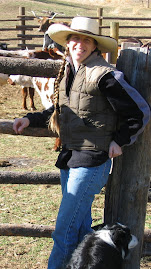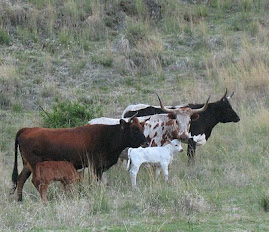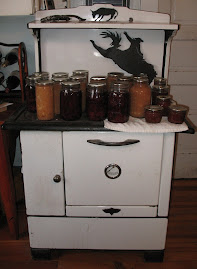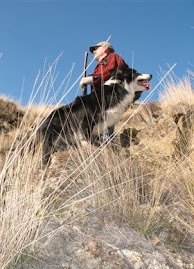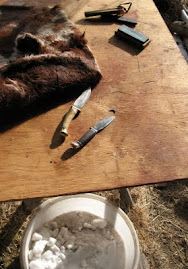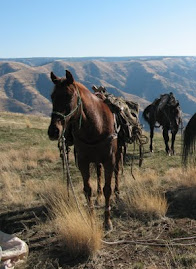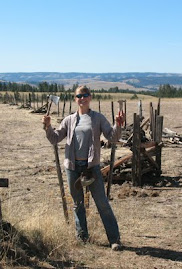For Caryl Coppin, 1917-2010
It's nearly March and the first buttercups speckle the canyon slopes. Like shiny gold buttons on tiny stems, they tremble in the stiff breeze, resolutely facing south as if determined to absorb every possible ray of sun.
I lean over in the saddle and marvel at how many cups of gold there are today when just yesterday I counted only seven. We are riding after cattle and I'm glad. There are few jobs better than the ones that find us horseback in the canyon on the cusp of green-up, on a blue-sky day.
But a part of me wishes I were out in town, at the old stone church where I know people will be gathered. I could tell this story, of the buttercups, of alders trailing their ruddy catkins, and wild geese returned to nest in the tall grass. I could tell about the fisherman I didn't see, who swathed in waders, lost his footing and stumbled like a drunk across the cobble, how he set my horse leaping sideways up the bank and me flopping in the saddle with half a brain saying--what the heck, while the other half reminded me to reach down and grab a rein.
And there was more. The gather and turn of the cattle with shouts of "come by" and "away to me", the dogs circling and holding the herd. The splash across the river, our horses' legs inside the ripple, the deeply colored stones awash below. The nod of horns and the climb of haunches trailing upslope to benches spread in winter bunchgrass, golden with a hint of green. The long trot toward home and afterward the oily glow of kerosene at the dinner table and the home-cooked meal, last year's beef, some cellared spuds and squash.
Of all the people who would have told me to stay away from town, there's only one I listened to today. I can hear her plain as I can see her, the nod of silver hair as she waves her hand between us. Go on, I hear her saying. You've got work to do. And your husband, why I'm sure he's waiting.
And it's this love of living, in every chore and season, in labor and invention, in showing and learning how, in celebration and in passing, that keeps me here, among the cattle.
Yes, I could be in town. But here, she's riding with me, just behind the cantle with her slender arms around my waist, her story in my ear about how it used to be, and still is.
From Sara at Magpie Ranch, home of Bunchgrass Beef
Friday, February 26, 2010
Monday, February 8, 2010
Signs
I'm convinced. More than that, I'm delirious. How can such a simple thing as horses shedding gobs of long coarse hairs, clogging up the curry comb and sticking to me like velcro, elicit feelings of glee?
And, there were geese poking about in the bends of the river, and song birds arrived to flit and scurry in the brush, and, yes really and truly, there are buds on the willows and birches.
The final note to convince me arrived on Saturday night, when I heard the bouncing calls of the screech owls, returned to the locust grove to mate and nest and raise their young. The stars were fierce and I dragged Mike out of the warm house to help me look for constellations and listen to the owls. The blanket of stars was so thick it almost felt suffocating, like being outnumbered and scrutinized by a gazillion other worlds. Innumerable tiny sparks and closer to us, several large stars sharply pulsating in brilliant blue and orange.
I was searching for my old friends, the Seven Sisters. It's odd how stars befriend us, become like members of the family who you miss when they are gone and welcome back upon their return. When we lived at the equator, I felt little kinship for the night sky, even though I still longed for and appreciated seeing the stars. Where was the big dipper? I felt displaced, a stranger. By the end of the year, the Southern Cross was my new companion.
In the canyon, sky is reduced to whatever opening the ridges grant you in the particular spot where you are working. Places on the rivers, like Dug Bar on the Snake, or at Magpie on the Imnaha, give us more to consider. But tucked away in a narrow draw, like up Pumpkin Creek,there is only a sliver of sky to befriend us between the dark pines and heavy basalt walls.
So Saturday night as I stood under a span of sky, saying hello to the Seven Sisters, listening to the screech owl calling from the ancient locust tree behind me, with a carpet of cast-off dun horse hair beneath my feet, it was unmistakeable. February, the dying month, is also the harbinger of change.
Red and brown and tan will soon become the backdrop for winsome buttercups, then all manner of pink and white and yellow and purple and blue and orange will spring up, and shoots in every shade of green. I'm getting ahead of myself.
But one last thing. I could smell it. I could smell the river banks, coming to life, the mud and ooze, the day-warmed rocks, the rot. Glorious.
From Sara at Magpie Ranch, home of Bunchgrass Beef
And, there were geese poking about in the bends of the river, and song birds arrived to flit and scurry in the brush, and, yes really and truly, there are buds on the willows and birches.
The final note to convince me arrived on Saturday night, when I heard the bouncing calls of the screech owls, returned to the locust grove to mate and nest and raise their young. The stars were fierce and I dragged Mike out of the warm house to help me look for constellations and listen to the owls. The blanket of stars was so thick it almost felt suffocating, like being outnumbered and scrutinized by a gazillion other worlds. Innumerable tiny sparks and closer to us, several large stars sharply pulsating in brilliant blue and orange.
I was searching for my old friends, the Seven Sisters. It's odd how stars befriend us, become like members of the family who you miss when they are gone and welcome back upon their return. When we lived at the equator, I felt little kinship for the night sky, even though I still longed for and appreciated seeing the stars. Where was the big dipper? I felt displaced, a stranger. By the end of the year, the Southern Cross was my new companion.
In the canyon, sky is reduced to whatever opening the ridges grant you in the particular spot where you are working. Places on the rivers, like Dug Bar on the Snake, or at Magpie on the Imnaha, give us more to consider. But tucked away in a narrow draw, like up Pumpkin Creek,there is only a sliver of sky to befriend us between the dark pines and heavy basalt walls.
So Saturday night as I stood under a span of sky, saying hello to the Seven Sisters, listening to the screech owl calling from the ancient locust tree behind me, with a carpet of cast-off dun horse hair beneath my feet, it was unmistakeable. February, the dying month, is also the harbinger of change.
Red and brown and tan will soon become the backdrop for winsome buttercups, then all manner of pink and white and yellow and purple and blue and orange will spring up, and shoots in every shade of green. I'm getting ahead of myself.
But one last thing. I could smell it. I could smell the river banks, coming to life, the mud and ooze, the day-warmed rocks, the rot. Glorious.
From Sara at Magpie Ranch, home of Bunchgrass Beef
Wednesday, February 3, 2010
February Storm
The storm that just came through dumped a ton of rain in the canyon. During the night we heard the rain on the roof, steady, steady, steady and woke up early to heavy clouds like a lid on the canyon. As the clouds shifted, the end of a high ridge above the house would poke through the storm. The glimpse of jagged snow-covered cliffs hovering above the clouds reminded me of Unuru, our Mongolian friend, who always referred to the canyon rims as “beautiful mountains.”
Our plan to ride for cattle quickly changed to a day working on corrals and outbuildings. With the top layer of soil on steep north facing slopes thawed and saturated, it was too slick, too mucky, and too soft for trailing.
The thermometer hovered at 36 degrees as sodden cold sucked at our bundled bodies, but I noted with glee the tiny green plants germinating in protected spots and the green shoots of grass poking up in the orchard. There is a turn in the air, and inside my own cells a small voice ringing the bell of spring.
After a fast hike to the bench to spot the herd left me with boots and jeans soaked through and hands damp and numbed inside their gloves, my thoughts were only on the woodstove and a mug of hot tea. The winter canyon has many labors to consider. And many gifts as well, as this poem from the Magpie Ranch journal reminds me.
February Canyon
This is an hour when all could find a will to live.
A solitary hour with no other human soul in sight, among the wind, the bleached grasses,
the rust colored locust pods in their transient, timeless places.
And the river, industrious, committed to its journey, as if each vesicle,
each droplet riffle-joined, had passed these rocks and willow-matted shores
uncounted times before, such that their passing now earns not a glance
or hesitation in the scour and fall and pour.
And shadows cut a mirror likeness of their great rimmed parents,
echoes of light so stark they seem more solid than the rock-ridged walls that cast them,
predictable in their march from day to night, a conquest far beyond the tiny paths of men,
and knowing every crack and frond and seep and newly tumbled stone.
This is the opera of our days, the great unfolding from which scatter forth
the reds and browns of story, the blues and greens of life, the germ and decay,
the blossom and fruit, the wing and song, the hum and foam, the toil.
We populate this place with more than those of us who are living.
From Sara at Magpie Ranch, home of Bunchgrass Beef
Our plan to ride for cattle quickly changed to a day working on corrals and outbuildings. With the top layer of soil on steep north facing slopes thawed and saturated, it was too slick, too mucky, and too soft for trailing.
The thermometer hovered at 36 degrees as sodden cold sucked at our bundled bodies, but I noted with glee the tiny green plants germinating in protected spots and the green shoots of grass poking up in the orchard. There is a turn in the air, and inside my own cells a small voice ringing the bell of spring.
After a fast hike to the bench to spot the herd left me with boots and jeans soaked through and hands damp and numbed inside their gloves, my thoughts were only on the woodstove and a mug of hot tea. The winter canyon has many labors to consider. And many gifts as well, as this poem from the Magpie Ranch journal reminds me.
February Canyon
This is an hour when all could find a will to live.
A solitary hour with no other human soul in sight, among the wind, the bleached grasses,
the rust colored locust pods in their transient, timeless places.
And the river, industrious, committed to its journey, as if each vesicle,
each droplet riffle-joined, had passed these rocks and willow-matted shores
uncounted times before, such that their passing now earns not a glance
or hesitation in the scour and fall and pour.
And shadows cut a mirror likeness of their great rimmed parents,
echoes of light so stark they seem more solid than the rock-ridged walls that cast them,
predictable in their march from day to night, a conquest far beyond the tiny paths of men,
and knowing every crack and frond and seep and newly tumbled stone.
This is the opera of our days, the great unfolding from which scatter forth
the reds and browns of story, the blues and greens of life, the germ and decay,
the blossom and fruit, the wing and song, the hum and foam, the toil.
We populate this place with more than those of us who are living.
From Sara at Magpie Ranch, home of Bunchgrass Beef
Subscribe to:
Comments (Atom)


